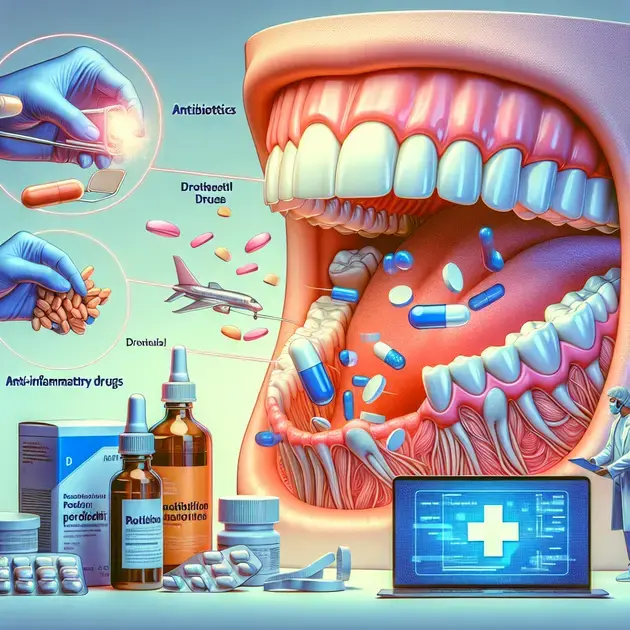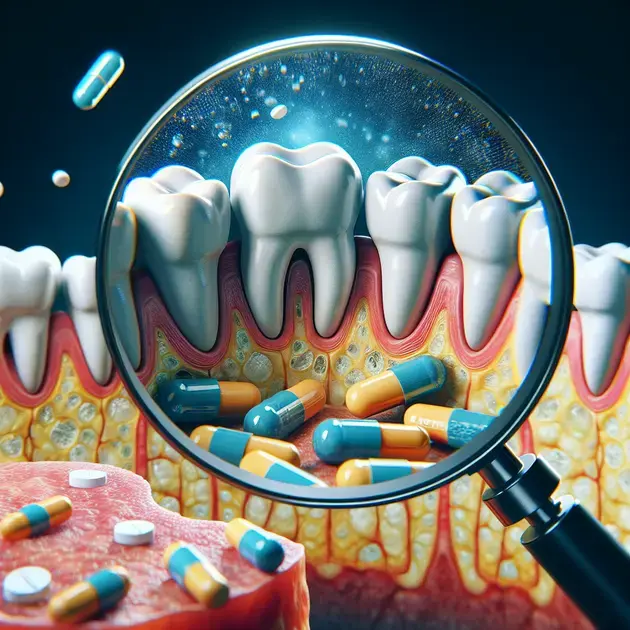When it comes to dealing with periodontitis, finding an effective medication is crucial for managing the condition. Patients diagnosed with periodontitis often require specialized treatment to alleviate symptoms and improve oral health.
Understanding the different types of medication available and how they work can provide valuable insight into the most suitable treatment options for periodontitis. From antibiotics to antimicrobial mouthwashes, knowing what you need to know about effective medication for periodontitis is essential in combating this common dental issue.

Understanding Periodontitis Medication Options
Periodontitis is a serious gum infection that damages the soft tissue and destroys the bone supporting your teeth. When it comes to treating periodontitis, medication can play a key role in managing the symptoms and preventing further progression of the disease. Understanding the medication options available is essential for effective treatment.
One of the common medication options for periodontitis is antibiotics. These drugs help control bacterial growth in the mouth, reducing inflammation and aiding in the healing process. Examples of antibiotics commonly prescribed for periodontitis include doxycycline and metronidazole. These medications can be taken orally or applied directly to the gums in the form of gels or mouth rinses.
Another type of medication used for periodontitis is antimicrobial mouthwashes. These mouthwashes contain active ingredients that help reduce plaque buildup and fight off bacteria in the mouth. Chlorhexidine is a common antimicrobial agent found in many prescription mouthwashes recommended for periodontitis treatment.
In addition to antibiotics and mouthwashes, your dentist may also prescribe pain relievers or anti-inflammatory drugs to help manage discomfort and swelling associated with periodontitis. These medications can provide relief while the underlying infection is being treated.
To ensure the effectiveness of your medication treatment for periodontitis, it is important to follow your dentist’s instructions carefully. Take medications as prescribed, maintain good oral hygiene practices, and attend regular dental check-ups to monitor your progress.
Exploring How Medication Works for Periodontitis
Understanding how medication works for periodontitis involves recognizing the mechanisms by which different drugs target the infection and promote healing in the gums. Antibiotics, for example, work by inhibiting the growth of bacteria responsible for causing periodontitis. By reducing bacterial activity, antibiotics help control inflammation and prevent further damage to the gums and bone.
Antimicrobial mouthwashes, on the other hand, work by directly targeting and killing bacteria in the mouth. These mouthwashes can reach areas that may be difficult to clean with regular brushing and flossing, providing an additional layer of protection against infection.
Pain relievers and anti-inflammatory drugs help manage the symptoms of periodontitis by reducing pain, swelling, and discomfort in the gums. These medications can improve your overall comfort level while undergoing treatment for the underlying infection.
It is important to note that medication alone is not sufficient to treat periodontitis effectively. Proper oral hygiene practices, such as regular brushing, flossing, and professional cleanings, are crucial for maintaining the health of your gums and supporting the effects of medication treatment.
By exploring how different medications work for periodontitis, you can gain a better understanding of the role each drug plays in managing the infection and promoting oral health.
Choosing the Right Medication for Periodontitis
When it comes to choosing the right medication for periodontitis, it is essential to consult with your dentist or periodontist to determine the most appropriate treatment plan for your specific condition. The type of medication prescribed will depend on the severity of the infection, your overall health, and any existing medical conditions you may have.
During your dental appointment, your dentist will evaluate the extent of the gum disease and recommend a suitable course of treatment. This may include a combination of antibiotics, antimicrobial mouthwashes, and pain relievers to address the infection and alleviate symptoms.
Factors such as drug interactions, allergic reactions, and potential side effects should also be taken into consideration when choosing the right medication for periodontitis. Be sure to inform your dentist about any medications you are currently taking and any medical conditions you have to avoid complications.
It is important to follow the prescribed medication regimen diligently and attend follow-up appointments as scheduled to monitor your progress. Your dentist may adjust your treatment plan based on how well the medication is working and the overall health of your gums.
By working closely with your dental professional and following their guidance, you can choose the right medication for periodontitis that best suits your individual needs and promotes optimal oral health.

Understanding Periodontitis Medication Options
When it comes to treating periodontitis, there are various medication options available to help manage this oral health condition. These medications are designed to target the bacteria that cause gum inflammation and infection, ultimately helping to reduce the symptoms of periodontitis. Understanding the different medication options can be crucial in effectively addressing the condition.
One common type of medication used for periodontitis is antimicrobial mouth rinses. These rinses contain ingredients that can help kill bacteria in the mouth, reducing the bacterial load in the gums and preventing further infection. Antimicrobial mouth rinses are often prescribed as a supplementary treatment to regular dental cleanings and good oral hygiene practices.
Another medication option for periodontitis is antibiotic therapy. Antibiotics can be taken orally or applied directly to the gums in the form of gels or chips. These medications work to eliminate the harmful bacteria causing the gum disease and promote healing of the gum tissues. It is important to use antibiotics as prescribed by a dentist to avoid antibiotic resistance.
In some cases, anti-inflammatory medications may also be prescribed to manage the symptoms of periodontitis. These medications can help reduce inflammation in the gums and alleviate pain and discomfort associated with the condition. By addressing the inflammation, anti-inflammatory medications can support the healing process in the gums.
Overall, the choice of medication for periodontitis will depend on the severity of the condition and the individual patient’s needs. It is essential to consult with a dental professional to determine the most suitable medication option for effectively treating periodontitis and improving oral health.
Exploring How Medication Works for Periodontitis
Medication for periodontitis works by targeting the underlying causes of the gum disease, primarily the bacteria that lead to inflammation and infection in the gums. The medication’s goal is to eliminate harmful bacteria, reduce inflammation, and promote the healing of the gum tissues. By effectively addressing these aspects of periodontitis, medication can help manage the condition and improve oral health.
Antimicrobial mouth rinses, for example, work by directly killing bacteria in the mouth, reducing the bacterial load in the gums, and preventing further infection. This can help control the progression of periodontitis and support the effectiveness of other dental treatments such as scaling and root planing.
Antibiotics, whether taken orally or applied topically, target specific bacteria causing periodontitis. By using antibiotics, dentists can help eliminate the bacterial infection and create a more favorable environment for gum tissue healing. It is essential to follow the prescribed dosage and duration of antibiotics to achieve optimal results.
Anti-inflammatory medications work by reducing the inflammation in the gums, which is a common symptom of periodontitis. By addressing the inflammation, these medications can help alleviate discomfort and support the healing process in the gum tissues. This can contribute to better overall oral health and improved outcomes in periodontal treatment.
Understanding how medication works for periodontitis is crucial in maximizing its benefits and ensuring proper management of the condition. By working with a dental professional and following their recommendations, patients can effectively incorporate medication into their periodontal treatment plan.
Choosing the Right Medication for Periodontitis
When selecting the right medication for periodontitis, several factors need to be considered to ensure effective treatment and optimal outcomes. The severity of the gum disease, the patient’s overall health, and any potential side effects of the medication are crucial aspects to evaluate when choosing the appropriate treatment option.
For mild cases of periodontitis, antimicrobial mouth rinses may be sufficient to manage the condition and improve gum health. These rinses can help control bacteria levels in the mouth and support regular oral hygiene practices to prevent further progression of the disease.
In more severe cases of periodontitis, antibiotic therapy may be necessary to address the bacterial infection and promote healing of the gum tissues. Dentists may prescribe oral antibiotics or recommend local application of antibiotics to target the specific bacteria causing the gum disease.
Patients with inflammation and discomfort may benefit from anti-inflammatory medications to alleviate symptoms and support the healing process in the gums. These medications can help reduce swelling and pain, making it easier for patients to maintain good oral hygiene and receive necessary dental treatments.
Ultimately, the right medication for periodontitis will be determined by a dental professional based on the individual patient’s needs and the specific characteristics of the gum disease. By working collaboratively with a dentist and following their guidance, patients can choose the most suitable medication to effectively manage periodontitis and improve their oral health.
Conclusion
Understanding the medication options for treating periodontitis is essential for effectively managing this oral health condition. Through antimicrobial mouth rinses, antibiotics, and anti-inflammatory medications, patients can target the root causes of gum disease and reduce inflammation and infection. By working with dental professionals to choose the right medication based on the severity of the condition and individual needs, individuals can significantly improve their oral health.
Medication plays a pivotal role in combating periodontitis by specifically targeting the bacteria responsible for gum inflammation and infection. Antimicrobial mouth rinses work by eliminating bacteria in the mouth, aiding in the prevention of further infection and supporting other dental treatments. Antibiotics, whether oral or topical, directly combat harmful bacteria, creating a conducive environment for gum tissue healing when used correctly.
When it comes to managing periodontitis, the choice of medication should consider the severity of the disease, the patient’s overall health, and potential side effects. While mild cases may find relief with antimicrobial mouth rinses, severe conditions often require antibiotic therapy for effective healing. Additionally, anti-inflammatory medications can help alleviate discomfort, reduce swelling, and support the overall healing process in the gums.



